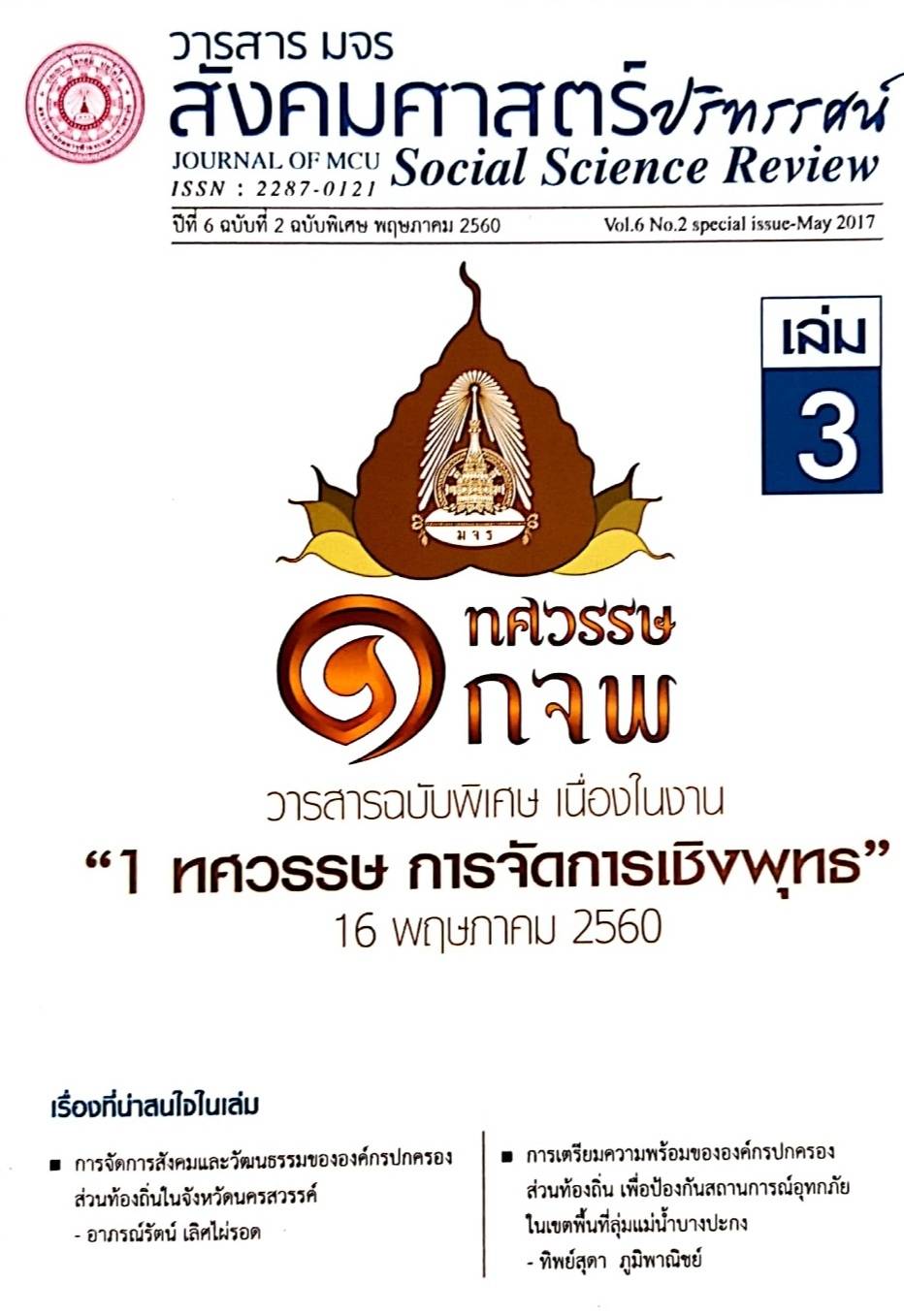จริยธรรมของผู้บริหารสถานศึกษาในศตวรรษที่ 21 สำหรับโรงเรียนมัธยมศึกษา ในสังกัดสำนักงานศึกษาธิการภาค 4
คำสำคัญ:
จริยธรรม, ผู้บริหารสถานศึกษาบทคัดย่อ
การวิจัยมีวัตถุประสงค์เพื่อ 1) ศึกษาองค์ประกอบของจริยธรรมผู้บริหารสถานศึกษาใน ศตวรรษที่ 21 และ 2) เพื่อเป็นแนวทางการปฏิบัติตนด้านจริยธรรมผู้บริหารสถานศึกษาในศตวรรต ที่ 21 วิจัยครั้งนี้เป็นการวิจัยแบบผสม ประชากรในการวิจัยเชิงปริมาณ คือ ผู้อานวยการและและ หัวหน้างานหรือหัวหน้ากลุ่มสาระ การเรียนรู้หรือครูโรงเรียนมัธยมศึกษาในสังกัดสำนักงาน ศึกษาธิการภาค 4 ในโรงเรียนมัธยมศึกษาสังกัดสานักงานศึกษาธิการภาค 4 จำนวน 116 โรงเรียน กลุ่มตัวอย่าง คือ ผู้อำนวยการและหัวหน้างานหรือหัวหน้ากลุ่มสาระการเรียนรู้หรือครูในโรงเรียน มัธยมศึกษาสังกัดสำนักงานศึกษาธิการภาค 4 จานวน 92 โรงเรียน รวมทั้งสิ้น 184 คน เครื่องมือที่ ใช้ได้แก่ แบบสัมภาษณ์แบบไม่มีโครงสร้างและแบบสอบถามความคิดเห็น สถิติที่ใช้ในการวิเคราะห์ ข้อมูล ได้แก่ ค่าความถี่ ค่าร้อยละ ค่ามัชฌิมเลขคณิต ส่วนเบี่ยงเบนมาตรฐาน การวิเคราะห์ องค์ประกอบ การวิเคราะห์เนื้อหา และการประชุมกลุ่มของผู้ทรงคุณวุฒิจากโรงเรียนมัธยมศึกษา สังกัดสานักงานศึกษาธิการภาค 4 ซึ่งมีคุณวุฒิระดับดุษฎีบัณฑิต สาขาการบริหารการศึกษา จำนวน 9 คน
ผลการวิจัย พบว่า
1. องค์ประกอบจริยธรรมผู้บริหารสถานศึกษาในศตวรรษที่ 21 ประกอบด้วย 9 ด้าน ได้แก่ ด้านการมีส่วนร่วม ด้านภาวะผู้นา ด้านความเป็นประชาธิปไตย ด้านกัลยาณมิตร ด้านหลัก ธรรมาภิบาล ด้านความมีเหตุผล ด้านการสร้างเสริมกาลังใจ ด้านความซื่อสัตย์ และด้านการเป็น แบบอย่างที่ดีของผู้นำ
2.แนวทางในการปฏิบัติด้านจริยธรรมผู้บริหารสถานศึกษาในศตวรรษที่ 21 มี 4 แนวทางได้แก่ ด้านการพัฒนาตนเองให้เป็นผู้บริหารมืออาชีพ ด้านการสนับสนุนด้านนโยบาย ด้าน การสนับสนุนอบรม ด้านจริยธรรม และด้านการเป็นแบบอย่างที่ดีของผู้นำ
เอกสารอ้างอิง
ชุติมา รักษ์บางแหลม. (2529). ภาวะผู้นำเชิงจริยธรรม : หนทางสู่การขับเคลื่อนภาวะผู้นำในสถาบันการศึกษา Ethical Leadership : The Power Driven Force to Leadership in Educational Institute. วิทยานิพนธ์ปริญญาศึกษาศาสตร์ดุษฎีบัณฑิต :มหาวิทยาลัยนราธิวาสราชนครินทร์.
ณัฐตะวัน ลิ้มประสงค์. (2556). การบริหารจัดการประกันคุณภาพสถานศึกษาสำหรับอนาคต.ปริญญาดุษฎีนิพนธ์ คณะศึกษาศาสตร์ บัณฑิตวิทยาลัย สาขาวิชาการบริหารการศึกษามหาวิทยาลัยศิลปากร.
นิษฐ์วดี จิรโรจน์ภิญโญ. (2556). พฤติกรรมการบริหารสถานศึกษาของผู้บริหารสตรี. ปริญญาดุษฎีนิพนธ์ คณะศึกษาศาสตร์ บัณฑิตวิทยาลัย สาขาวิชาการบริหารการศึกษา มหาวิทยาลัยศิลปากร.
ประคอง รัศมีแก้ว. (2551). คุณลักษณะของผู้นาของผู้บริหารในสถานศึกษาที่มีคุณภาพดุษฎีนิพนธ์ ปริญญาปรัชญาดุษฎีบัณฑิต สาขาวิชาการบริหารการศึกษา บัณฑิตวิทยาลัย :มหาวิทยาลัยศิลปากร.
ประจวบ หนูเลี่ยง เด่น ชะเนติยัง และนวลพรรณ วรรณสุธี. (2559). การพัฒนารูปแบบการจัดการศึกษาแบบมีส่วนร่วมของจังหวัดพัทลุง. ปริญญาดุษฎีบัณฑิต สาขาวิชาการบริหารการศึกษา: มหาวิทยาลัยเวสเทิร์น. 233-243.
ประทีป มากมิตร. (2550). จริยธรรมของผู้บริหารสถานศึกษาสถาบันอุดมศึกษาเอกชน. ดุษฎีนิพนธ์ ปริญญาปรัชญาดุษฏีบัณฑิต บัณฑิตวิทยาลัย : มหาวิทยาลัยศิลปากร.
มัทนา วังถนอมศักดิ์. (2550). รูปแบบแรงจูงใจในการปฏิบัติงานของครู. ปริญญาดุษฎีนิพนธ์ คณะศึกษาศาสตร์ บัณฑิตวิทยาลัย สาขาวิชาการบริหารการศึกษา มหาวิทยาลัยศิลปากร.
มาศโมฬี จิตวิริยธรรม. (2552). คุณธรรมที่ส่งเสริมการเป็นกัลยาณมิตรของผู้บริหารในสถาบันอุดมศึกษาของรัฐ. ปริญญาดุษฎีนิพนธ์ คณะศึกษาศาสตร์ บัณฑิตวิทยาลัยสาขาวิชาการบริหารการศึกษา มหาวิทยาลัยศิลปากร.
สุรเชษฐ์ โซวเกียรติรุ่ง. (2553). คุณธรรมและจริยธรรมสาหรับผู้นำ. วารสารการพัฒนาทรัพยากรมนุษย์, ปีที่ 6, 166-175.
Richard. G. (2010). Eventful Cities : Cultural Management. London: Rutledge.
ดาวน์โหลด
เผยแพร่แล้ว
รูปแบบการอ้างอิง
ฉบับ
ประเภทบทความ
สัญญาอนุญาต
ลิขสิทธิ์ (c) 2020 วารสาร มจร สังคมศาสตร์ปริทรรศน์

อนุญาตภายใต้เงื่อนไข Creative Commons Attribution-NonCommercial-NoDerivatives 4.0 International License.
เพื่อให้เป็นไปตามกฎหมายลิขสิทธิ์ ผู้นิพนธ์ทุกท่านต้องลงลายมือชื่อในแบบฟอร์มใบมอบลิขสิทธิ์บทความให้แก่วารสารฯ พร้อมกับบทความต้นฉบับที่ได้แก้ไขครั้งสุดท้าย นอกจากนี้ ผู้นิพนธ์ทุกท่านต้องยืนยันว่าบทความต้นฉบับที่ส่งมาตีพิมพ์นั้น ได้ส่งมาตีพิมพ์เฉพาะในวารสาร มจร สังคมศาสตร์ปริทรรศน์ เพียงแห่งเดียวเท่านั้น หากมีการใช้ภาพหรือตารางหรือเนื้อหาอื่นๆ ของผู้นิพนธ์อื่นที่ปรากฏในสิ่งตีพิมพ์อื่นมาแล้ว ผู้นิพนธ์ต้องขออนุญาตเจ้าของลิขสิทธิ์ก่อน พร้อมทั้งแสดงหนังสือที่ได้รับการยินยอมต่อบรรณาธิการ ก่อนที่บทความจะได้รับการตีพิมพ์ หากไม่เป็นไปตามข้อกำหนดเบื้องต้น ทางวารสารจะถอดบทความของท่านออกโดยไม่มีข้อยกเว้นใดๆ ทั้งสิ้น





